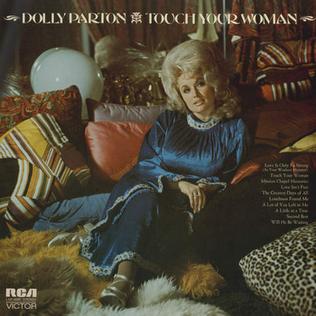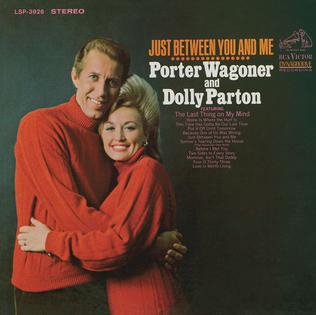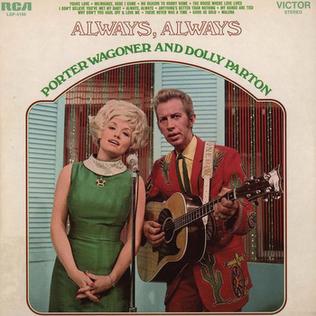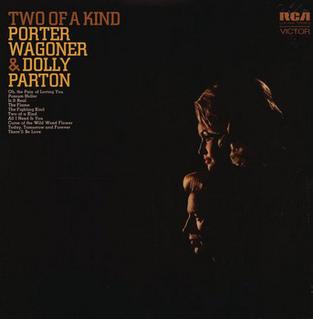Related Research Articles
Carroll County may refer to

John Marty Stuart is an American country and bluegrass music singer, songwriter, and musician. Active since 1968, Stuart initially toured with Lester Flatt, and then in Johnny Cash's road band before beginning work as a solo artist in the early 1980s. He is known for his combination of rockabilly, country rock, and bluegrass music influences, his frequent collaborations and cover songs, and his distinctive stage dress.

Porter Wayne Wagoner was an American country music singer known for his flashy Nudie and Manuel suits and blond pompadour.

Robert Bruce Ferguson was an American country music songwriter and record producer who was instrumental in establishing Nashville, Tennessee as a center of country music. He was also a movie producer, and Choctaw Indian historian. Ferguson is best known for writing the bestselling songs "On the Wings of a Dove" and "The Carroll County Accident". The "Carroll County Accident" won the Country Music Association Song of the Year in 1969. In 1983 "Wings of a Dove" was featured in the movie Tender Mercies starring Robert Duvall. In 1987, Broadcast Music Incorporated (BMI) awarded Ferguson with the "million air" plays for the "Wings of a Dove."

Coat of Many Colors is the eighth solo studio album by American singer-songwriter Dolly Parton. It was released on October 4, 1971, by RCA Victor. The album was nominated for Album of the Year at the 1972 CMA Awards. It also appeared on Time magazine's list of the 100 Greatest Albums of All Time and at No. 257 on Rolling Stone's 2020 list of the 500 Greatest Albums of All Time. Parton has cited the title track on numerous occasions as her personal favorite of all the songs she has written.

Bubbling Over is the twelfth solo studio album by American singer-songwriter Dolly Parton. It was released on September 10, 1973, by RCA Victor. The album cover photo was shot by Nashville photographer Les Leverett near the fountain at the Country Music Hall of Fame.

Touch Your Woman is the ninth solo studio album by American singer-songwriter Dolly Parton. It was released on March 6, 1972, by RCA Victor. The album's title song and single, "Touch Your Woman", was nominated for a Grammy.

Just Between You and Me is the first collaborative studio album by Porter Wagoner and Dolly Parton. It was released on January 15, 1968, by RCA Victor. The album was produced by Bob Ferguson. It peaked at number eight on the Billboard Top Country Albums chart and spawned one single, "The Last Thing on My Mind", which peaked at number seven on the Billboard Hot Country Songs chart.

Just the Two of Us is the second collaborative studio album by Porter Wagoner and Dolly Parton. It was released on September 9, 1968, by RCA Victor. The album was produced by Bob Ferguson. It peaked at number five on the Billboard Top Country Albums chart and number 184 on the Billboard 200 chart. The album spawned three singles. "Holding on to Nothin'" and "We'll Get Ahead Someday" were top ten hits on the Billboard Hot Country Songs chart, peaking at numbers seven and five, respectively. The third single, "Jeannie's Afraid of the Dark", peaked at number 51.

Just Because I'm a Woman is the second solo studio album by American singer-songwriter Dolly Parton. It was released on April 15, 1968, by RCA Victor. The album was produced by Bob Ferguson. It peaked at number 22 on the Billboard Top Country Albums chart. The album's title track was the only single released and it peaked at number 17 on the Billboard Hot Country Singles chart.

My Blue Ridge Mountain Boy is the fourth solo studio album by American singer-songwriter Dolly Parton. It was released on September 8, 1969, by RCA Victor. The album was produced by Bob Ferguson. It peaked at number six on the Billboard Top Country Albums chart, Parton's first solo top ten, and number 194 on the Billboard 200 chart. The album spawned three singles: "Daddy", "In the Ghetto", and the title track. "Daddy" was the most successful, peaking at number 40 on the Billboard Hot Country Songs chart.

In the Good Old Days (When Times Were Bad) is the third solo studio album by American singer-songwriter Dolly Parton. It was released on February 3, 1969, by RCA Victor. The album was produced by Bob Ferguson. It peaked at number 15 on the Billboard Top Country Albums chart. The album's title track was the only single released and it peaked at number 25 on the Billboard Hot Country Songs chart.

Always, Always is the third collaborative studio album by Porter Wagoner and Dolly Parton. It was released on June 30, 1969, by RCA Victor. The album was produced by Bob Ferguson. It peaked at number five on the Billboard Top Country Albums chart and number 162 on the Billboard 200 chart. "Yours Love" and the album's title track were released as singles, peaking at numbers nine and 16, respectively.

The Fairest of Them All is the fifth solo studio album by American singer-songwriter Dolly Parton. It was released on February 2, 1970, by RCA Victor. The album was produced by Bob Ferguson. It was the first of Parton's albums on which she wrote the majority of the songs. The Fairest of Them All peaked at number 13 on the Billboard Top Country Albums chart. The album's only single, "Daddy Come and Get Me", peaked at number 40 on the Billboard Hot Country Songs chart.

A Real Live Dolly is the first live album by American singer-songwriter Dolly Parton. It was released on June 29, 1970, by RCA Victor. The album was produced by Bob Ferguson and was recorded on April 15, 1970, at Sevier County High School in Sevierville, Tennessee. It peaked at number 32 on the Billboard Top Country Albums chart and number 154 on the Billboard 200 chart.

Porter Wayne and Dolly Rebecca is the fourth collaborative studio album by Porter Wagoner and Dolly Parton. It was released on March 9, 1970, by RCA Victor. The album was produced by Bob Ferguson. It peaked at number four on the Billboard Top Country Albums chart and number 137 on the Billboard 200 chart. Two top ten singles were released from the album, "Just Someone I Used to Know" and "Tomorrow Is Forever", peaking at numbers five and nine, respectively. "Just Someone I Used to Know" was nominated for Best Country Performance by a Duo or Group at the 12th Annual Grammy Awards.

Once More is the fifth collaborative studio album by Porter Wagoner and Dolly Parton. It was released on August 3, 1970, by RCA Victor. The album was produced by Bob Ferguson. It peaked at number 7 on the Billboard Top Country Albums chart and number 191 on the Billboard 200 chart. The album's single, "Daddy Was an Old Time Preacher Man", peaked at number 7 on the Billboard Hot Country Songs chart and was nominated for Best Country Performance by a Duo or Group at the 13th Annual Grammy Awards.

Two of a Kind is the sixth collaborative studio album by Porter Wagoner and Dolly Parton. It was released on February 8, 1971, by RCA Victor. The album was produced by Bob Ferguson. It peaked at number 13 on the Billboard Top Country Albums chart and number 142 on the Billboard 200 chart. No singles were released from the album, but "Oh, the Pain of Loving You" was included as the B-side of the 1971 single "The Right Combination".

The Right Combination • Burning the Midnight Oil is the seventh collaborative studio album by Porter Wagoner and Dolly Parton. It was released on January 3, 1972, by RCA Victor.

"Daddy Sang Bass" is a song written by Carl Perkins, with lines from the chorus of "Will the Circle Be Unbroken?", and recorded by American country music singer Johnny Cash. It was released in November 1968 as the first single from the album The Holy Land. The song was Cash's sixty-first release on the country chart, going on to No. 1 on the Billboard country chart for 6 weeks and spending a total of 19 weeks there. The single reached No. 56 on the Cashbox pop singles chart in 1969. "Daddy Sang Bass" was also released on the Columbia Records Hall of Fame Series as a 45, #13-33153, b/w "Folsom Prison Blues". The record was nominated in the CMA awards category of Single of the Year by the Country Music Association (CMA) in 1969.
References
- 1 2 Whitburn, Joel (2008). Hot Country Songs 1944 to 2008. Record Research, Inc. pp. 441–442. ISBN 978-0-89820-177-2.
- ↑ The Essential Porter Wagoner (CD insert). Porter Wagoner. RCA Records. 1997. 66934-2.
{{cite AV media notes}}: CS1 maint: others in cite AV media (notes) (link) - ↑ "CMT : CMA Awards : Archives : 1969".